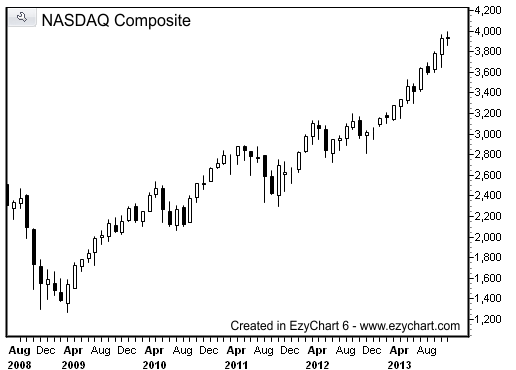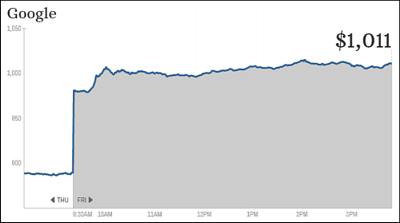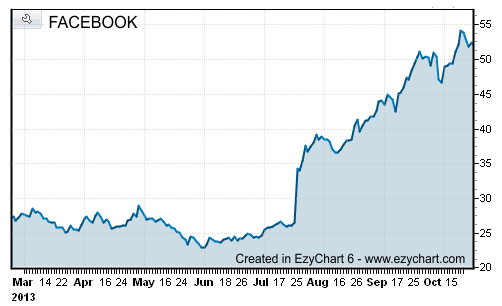- Active Investing - what is it?
- All Weather Trading Plan using Complex Theory (Parts 1 - 4)
- Asset Management (Parts 1 - 4)
- Back Testing
- Breaking out from consolidation
- Breakout trading in all market conditions
- Charting in a Nutshell
- Children of the Bear
- Fibonacci and the Golden Ratio
- Going Public
- Hull Moving Average
- MACD Breakout Trading (Parts 1 - 2)
- Making decisions with a Simple Moving Average
- Probability: do you have the stomach for it?
- Profit Taking
- Relative Strength
- Record Keeping
- Risky Business
- Short Selling
- Social Media Bubble
- Switching Gears
- Rate of Return indicator
- Time and Money
- Tools of the Trade
- Trade Warrants (Parts 1 - 4)
- Trading without spending money
- Trendlines
- Triangles
- GMMA's on Weekly Charts
- Writing Custom Indicators
Articles include:
Social media might be the ultimate undoing of the U.S. Federal Reserve. When you pump liquidity into a financial system it forms bubbles in risky assets all over the place and now its happened in America's own back yard. And given that I've never seen U.S. regulators, politicians or Wall Street ever slowly deflate an asset bubble, I believe the social media bubble that's now formed will likely be the trigger to bring down the whole economic house of cards.
I personally should have spotted this event a bit sooner as a classic blow-off pattern has been forming on the NASDAQ index for a while now. In the following monthly chart of the NASDAQ you can see how the long term trend has begun to accelerate in recent months. When this happens on a share it's not a good look but when it happens on a market index...watch out.

And this event is going largely unnoticed and that's no doubt because all of those involved in it are having a great time. After all, that's how bubbles get to be bubbles. But a few sober commentators and market watchers have picked it up and here's a recent article from the U.S.
Social Media: Why it's the Next Bubble to Burst
By Minyanville, September 27, 2013, 10:00:00 AM EDT www.nasdaq.com/author/minyanville
There are unintended consequences from loose monetary policy and easy money. When people look at the housing boom and bust, they tend to see the consequences of that easy money from 2003 to 2007 creating a boom in finance and housing, and then the bust that led to empty houses, bad loans, and over leveraged bets on Wall Street, bringing down Bear Stearns and Lehman Brothers.
However, the easy money split into other sectors; we saw a huge move in commodities and emerging markets. The move in commodities then split over into additional sectors. Because commodities went higher, alternative energy companies could compete with traditional energy firms, and there was cheap money around to finance them.
We saw a huge bubble in solar and wind energy. Stocks like First Solar and Suntech soared to dizzying heights -- and then crashed 80% to 90% or more.
While no one really talked about the solar and alternative energy bubble, it was a consequence of the loose money policies of the post-2001 period when the Fed kept interest rates down for too long.
I think that the true bubble this time around is in government bonds; people will look back in amazement that anyone ever thought that the 10-year US government bond was worth 1.38%.
However, one of the consequences of all this printed money is that some of it is going to flow into "hot sectors." In a recent article , I discussed Tesla Motors, an electric motor company that has been one of these hot stocks.
Fast money will always flow into new technologies that ignite the imagination. In 1999, it was the Internet; in 2007 and 2008, it was solar and wind power.
Now it is electric cars and social media. It seems like everyone these days has a Facebook or Twitter account. NFL players tweet about their concussions; it is a social phenomenon.
However, the valuations are ridiculous. Facebook trades at 122 times earnings and has a market cap of $122 billion. LinkedIn has a P/E of nearly 1,000 and a market cap of $28 billion. Pandora has a market cap of $4.52 billion (it's up 190% in 2013) and a P/E of 89 based on projected earnings.
We are now hearing the same type of comments that I heard during the dot-com bubble. It's all about the number of page views and people using these services in the future who could be "potential customers." This will end badly.
However, when the current money-printing and bond bubble bursts, these inflated social media stocks will surely collapse 80% to 90% -- or perhaps even more. Buyer beware.
I actually disagree with this last point; it will be the equity bubble that bursts first. So whilst the U.S. is in a fragile state and apparently still in need of its regular doses of stimulus (read $85 Billion per month), there's obviously plenty of money washing around the NASDAQ market. And it's not just the newbies and social media stocks that are enjoying the fun but some of the more established names are seeing their fair share of the easy money as well. Hence the following extract from an article on Google that appeared in mid October...
Google shares close above $1,000
By Ben Rooney @CNNMoneyInvest October 18, 2013: 4:24 PM ETGoogle shares soared above $1,000 a share early Friday (18th of Oct) as investors cheered the company's latest quarterly report. The stock surged nearly 14% to end at $1,011.41 a share, well above Google's previous all-time high of $928 set in July.

Late Thursday (17th of Oct), Google reported earnings and revenue that blew past investors' expectations, driven by strength in the company's core search business. The stock could head even higher, according to a raft of analyst reports published Friday.
Deutsche Bank was one of the most bullish, raising its price target for Google to $1,220 from $970.
Credit Suisse hiked its price target to $1,200 and Jefferies now thinks Google can hit $1,150 at some point over the next year.
Shares of Google are now up more than 40% this year. Amazingly enough, the stock has lagged the performance of two key rivals in 2013: Yahoo is up nearly 70% while Facebook has more than doubled.
Google is the second blue chip tech company to recently top $1,000 a share. Online travel site Priceline (another NASDAQ component) became the first to hit a four-digit stock price last month. Its stock is currently hovering around $1,050.
Analysts pointed to a number of factors behind their rosy outlook, including revenue from Google's "enhanced campaigns," which help marketers more easily run targeted ads on both desktop and mobile. YouTube in particular is expected to benefit from a shift in ad dollars away from traditional television.
Google is not alone in its quest to make more money off of mobile advertising. It's a main focus for Yahoo and Facebook as well. And Twitter, which will soon go public, is expected to be a force to be reckoned with in mobile ad sales too.
Happy days... And when a behemoth like Google with a market cap north of $300 Billion can jump 14% in a single trading period then you are definitely in a bull market. What's more, now we know where $30 Billion of stimulus has gone...into Google. This is why you can't maintain quantitative easing when you have an asset bubble...its like pumping up a tyre that has a leak.
But whilst the mainstays of the NASDAQ such as Google, Yahoo and Amazon are attracting some of the easy money, this appears to be a largely sector specific bubble focused on social media. Hence Facebook's price has doubled in 3 months. Here is a chart from JustData ...

Facebook trading on a price to earnings ratio (P/E) of 100 plus and LinkedIn just shy of 1,000 is ridiculous. It's one thing for the U.S. to overlook all the cheap money that's been invested in offshore risky assets but now its happening on their patch. They've now moved on from the property bubble aided by low interest rates to a social media bubble being fed by stimulus.
This is what Greenspan was referring to when he coined the phrase, 'irrational exuberance'. And once again the financial media are out to lunch when they should be reporting on this daily. So in my opinion...it's not a matter of if the U.S. will falter, but simply a matter of when.
And that's the tricky bit; when will it end? It's tricky because when markets behave in an irrational state then you know what's ultimately going to happen but you don't know the timing. So markets may rally further and if they do I will keep trading them very defensively as I will be a reluctant and nervous bull. But it's increasingly clear that America has gone mad.
And I'll finish on this bit of madness. Market updates on CNNMoney are now using comments from investor chat sites rather than expert commentary (fund managers and other analysts). Here's an extract from a recent investor update about Netflix (a NASDAQ stock)...
Earnings keep rolling in:
Netflix reported strong quarterly earnings and a rosy outlook late Monday. Shares initially surged to an all-time high in early trading, but quickly fell into the red. The stock finished down more than 9%.
Netflix shares have been on a tear all year, up nearly 250% so far. But Netflix CEO Reed Hastings said he isn't comfortable with the huge run-up. On a post-earnings conference call with analysts, he said Netflix thinks "momentum investors" are "driving the price more than we like normally" -- but that it's out of the company's control.
StockTwits user keywestbidwacker said Hasting's comments should be a red flag for investors. " never own a stock that a CEO talks down... not shareholder friendly at all... crazy...," he said.
It's not the CEO who's crazy as it is a very rare occasion that someone from inside a company actually has the integrity to state that they suspect their stock price is getting ahead of itself. It's the StockTwits user that's clearly crazy and CNNMoney for putting his comments prominently on one of the largest and most popular financial websites in the world. America has gone mad.